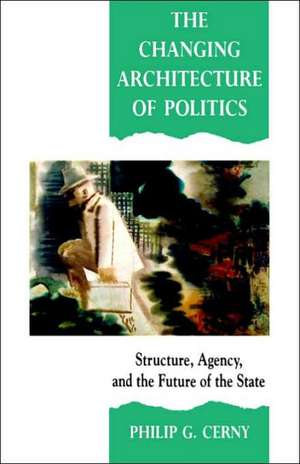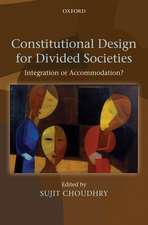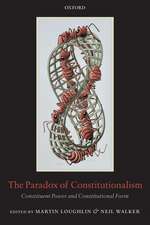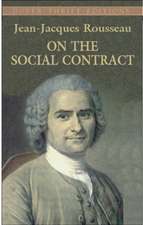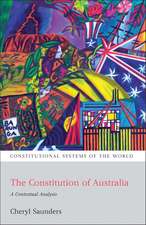The Changing Architecture of Politics: Structure, Agency and the Future of the State
Autor Philip G. Cernyen Limba Engleză Paperback – 12 feb 1990
Preț: 509.95 lei
Preț vechi: 599.95 lei
-15% Nou
Puncte Express: 765
Preț estimativ în valută:
97.58€ • 102.17$ • 80.94£
97.58€ • 102.17$ • 80.94£
Carte tipărită la comandă
Livrare economică 10-24 aprilie
Preluare comenzi: 021 569.72.76
Specificații
ISBN-13: 9780803982567
ISBN-10: 0803982569
Pagini: 288
Dimensiuni: 138 x 216 x 19 mm
Greutate: 0.4 kg
Ediția:1
Editura: SAGE Publications
Colecția Sage Publications Ltd
Locul publicării:London, United Kingdom
ISBN-10: 0803982569
Pagini: 288
Dimensiuni: 138 x 216 x 19 mm
Greutate: 0.4 kg
Ediția:1
Editura: SAGE Publications
Colecția Sage Publications Ltd
Locul publicării:London, United Kingdom
Recenzii
`In my view, it is the best introduction available in English to contemporary academic discussions about the purpose and prospects of applying the comparative method to political science.... Cerny's book is comprehensive in scope and accomplishes three quite rare tasks: it brings together material on North America, Western Europe and Japan... it combines theories of comparative politics and international relations; it pays equal attention to systems of party competition and of interest intermediation, although its primary focus is upon the state.... Philip Cerny has produced a tour de force, an intelligent, erudite and comprehensive text that cuts decisively through artificial barriers within the discipline' - Political Science Quarterly`Philip Cerny has written a superb analysis of the changing conditions of statehood' - Canadian Journal of Political Science
Cuprins
Preface and Introduction
PART ONE: THE PRINCIPLES OF POLITICAL STRUCTURATION: STRUCTURE, AGENCY, AND THE DEVELOPMENT OF THE MODERN STATE
Political Structuration and Political Science
The Elements of Political Structure
Patterns of Agency
Markets, Hierarchies and Political Allocation
The Modern State at the Crossroads
Structuring the Field of Political Action
PART TWO: CHANGING PATTERNS OF POLITICAL STRUCTURATION AND THE FUTURE OF THE STATE
The Limits of Political Power
Personal Leadership and Party Systems
The State and Interest Intermediation
Patterns of Collaborative Behaviour
The Paradox of Civil Society
De-differentiation and Re-differentiation in the Contemporary State
Transnational Structures and the State Responses
From the Welfare State to the Competition State
Epilogue
Political Structuration and Political Ideas in the 21st Century
PART ONE: THE PRINCIPLES OF POLITICAL STRUCTURATION: STRUCTURE, AGENCY, AND THE DEVELOPMENT OF THE MODERN STATE
Political Structuration and Political Science
The Elements of Political Structure
Patterns of Agency
Markets, Hierarchies and Political Allocation
The Modern State at the Crossroads
Structuring the Field of Political Action
PART TWO: CHANGING PATTERNS OF POLITICAL STRUCTURATION AND THE FUTURE OF THE STATE
The Limits of Political Power
Personal Leadership and Party Systems
The State and Interest Intermediation
Patterns of Collaborative Behaviour
The Paradox of Civil Society
De-differentiation and Re-differentiation in the Contemporary State
Transnational Structures and the State Responses
From the Welfare State to the Competition State
Epilogue
Political Structuration and Political Ideas in the 21st Century
Descriere
This original analysis of structuration, agency and the state offers an incisive explanation of the changing nature of the state.
Cerny argues that the state is not being transcended; the architecture of politics is not moving beyond the nation-state despite the emergence of transnational structures. He points to the movement of many states towards the model of the `competition state', and away from the model of `welfare state', as the major contemporary change in the role of the state. He asserts that new forms of political action will have to evolve if the state itself is to be controlled and used for the pursuit of deeper human values in the 21st century.
